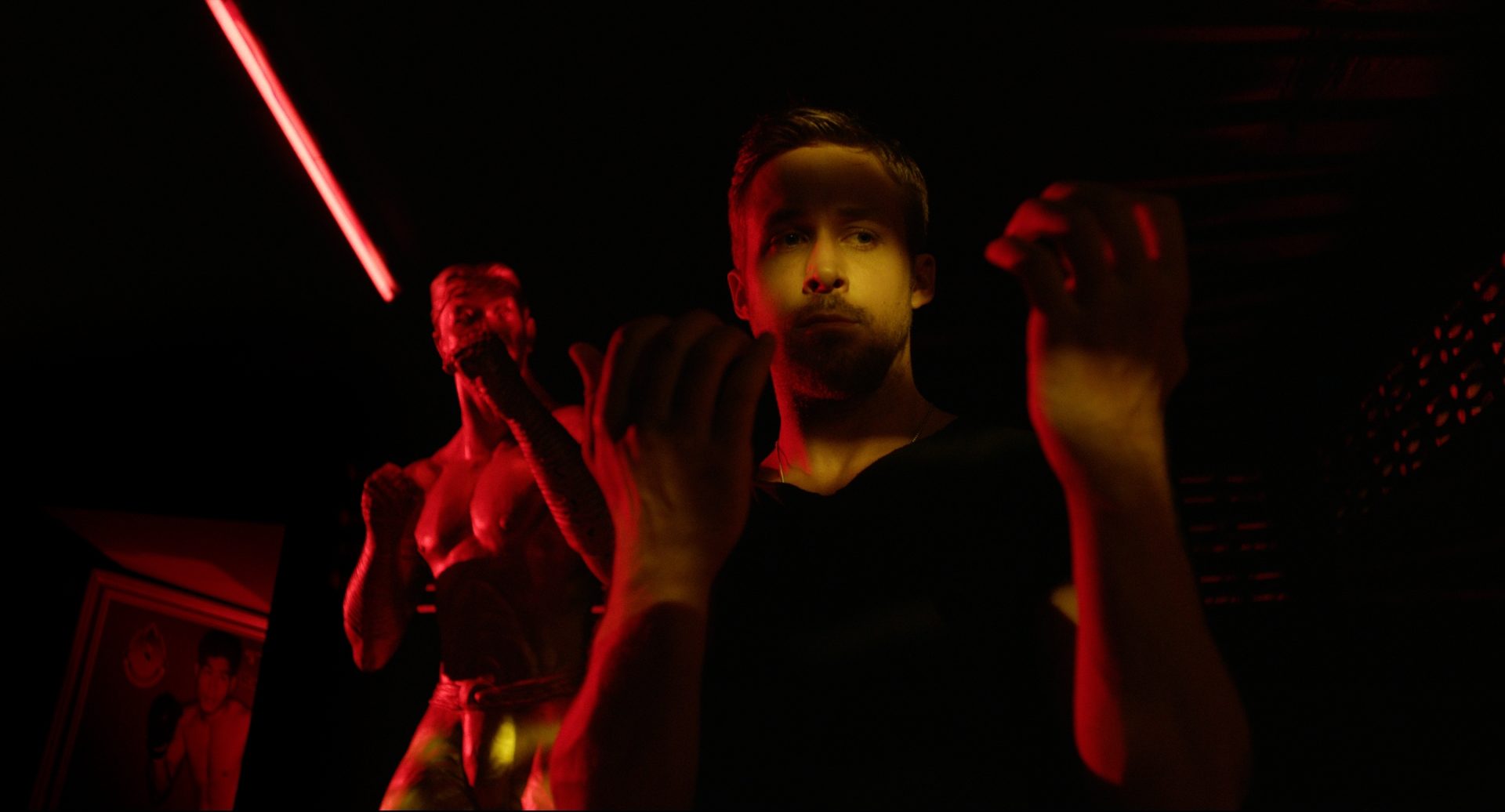Editorials
Stay Home, Watch Horror: 5 Neo-Giallo Movies to Stream This Week

The Last Matinee, the next Bloody Disgusting x Dark Star Pictures collaboration, arrives on VOD this Tuesday, August 24. It’s a gory neo-Giallo that sees a killer pick off unsuspecting patrons and employees at a movie theater one rainy day. Giallo seems to be making a resurgence in horror, at least in terms of its influence. James Wan recently cited Mario Bava and Dario Argento as influences on upcoming Malignant, and recent years have brought no shortage of Giallo-inspired contemporary horror.
This week belongs to neo-Giallo films that bring stylistic violence and bloodletting. Some poke fun at the tropes while others fully commit to visual style. Expect plenty of eyeball trauma, too.
Here’s where you can stream them all this week.
Cold Hell – AMC+, Shudder

Cold Hell blends Giallo with action, directed by Stefan Ruzowitzky, who helmed the underseen but fantastic horror film Anatomy. A serial killer is on the loose in Austria, targeting prostitutes and murdering them in a slow, gruesome fashion. When taxi driver Özge (Violetta Schurawlow) inadvertently witnesses one of the murders from her apartment window, she becomes the killer’s next target, and the police are of no help. Özge’s take no prisoners attitude and intense action sequences evoke retro action-brawler fare, making this one wholly new and exciting. Rich visuals with an emphasis on vivid colors and dark shadows work in conjunction with the sleazy murder mystery that makes Cold Hell a modern Giallo.
The Neon Demon – Prime Video

Nicolas Winding Refn’s neon-drenched fairytale nightmare draws heavily from Giallo horror. Sixteen-year-old Jesse (Elle Fanning) moves to Los Angeles in pursuit of modeling following the death of her parents. Her youthful beauty draws the attention, fascination, obsession, and murderous jealousy from everyone around her. Refn takes a more abstract, vivid approach heavy on imagery, both beautiful and macabre. It’s a high-concept allegory, so don’t expect a complex, narratively driven horror movie. The Neon Demon tends to mesmerize between the vibrant aesthetic and the boundary-pushing subject matter- including necrophilia and cannibalism.
The Editor – AMC+, Shudder, Tubi

Adam Brooks (Psycho Goreman) stars as Rey Cisco, a once-popular film editor that now works in exploitation after an accident left him without four fingers. When actors from his latest project turn up missing, Rey becomes the prime suspect. It’s up to Rey to investigate and clear his name, leading to some sinister discoveries. Less of a neo-Giallo and more of a loving parody of yesteryear’s Giallo, The Editor offers a lot to like even for those who do not like Giallo horror. Astron-6 playfully spoofs the subgenre’s tropes, from bad dubbing to nonsensical plot threads. It’s a sendup that embraces camp and doesn’t take itself seriously at all.
The Strange Color of Your Body’s Tears – AMC+, Shudder

Watching a movie by Hélène Cattet and Bruno Forzani feels more like drowning in a fevered dream. Its kaleidoscopic and hallucinogenic imagery crash into you like endless waves. The plot is practically irrelevant. In this case, a man returns home only to find his wife missing. He combs through the building room by room, plunging further and further into gory madness with every new encounter. It’s as violent as it is sexual, and you’ll come away not wholly sure of what you just watched.
Knife + Heart – AMC+, Kanopy, Shudder

Set in the Paris summer of 1979, Vanessa Paradis stars as Anne, a producer of low-budget gay porn. When her lover, who also happens to be her film editor, leaves her, she strikes out to make her most ambitious film yet in an attempt to win her back. The only problem is that a masked killer is picking off her cast and crew one by one in the most brutal fashion. Yann Gonzalez’s film is a gorgeous Giallo through and through, complete with all the familiar trademarks and tropes. The masked killer is unsettling, and those kills are downright vicious. If you love Giallo movies, this modern gem is not to be missed.

Editorials
11 Years Later: The Horrific Cycles of Violence in ‘Only God Forgives’ Starring Ryan Gosling

Traditionally, movie theater walkouts are usually associated with the horror genre, with infamous cases ranging from 1973’s The Exorcist (particularly during the crucifix masturbation scene) and even Lars Von Trier’s controversial serial killer memoir, The House That Jack Built.
That being said, there are exceptions to this rule, as some movies manage to terrorize audiences into leaving the theater regardless of genre. One memorable example of this is Nicolas Winding Refn’s 2013 revenge thriller Only God Forgives, a film so brutal and inaccessible that quite a few critics ended up treating it like a snuff film from hell back when it was first released. However, I’ve come to learn that horror fans have a knack for seeing beyond the blood and guts when judging the value of a story, and that’s why I’d like to make a case for Winding’s near-impenetrable experiment as an excellent horror-adjacent experience.
Refn originally came up with the idea for Only God Forgives immediately after completing 2009’s Valhalla Rising and becoming confused by feelings of anger and existential dread during his wife’s second pregnancy. It was during this time that he found himself imagining a literal fistfight with God, with this concept leading him to envision a fairy-tale western set in the far east that would deal with some of the same primal emotions present in his Viking revenge story.
It was actually Ryan Gosling who convinced the director to tackle the more commercially viable Drive first, as he wanted to cement his partnership with the filmmaker in a more traditional movie before tackling a deeply strange project. This would pay off during the production of Only God Forgives, as the filmmaking duo was forced to use their notoriety to scrounge up money at a Thai film festival when local authorities began demanding bribes in order to allow shooting to continue.
In the finished film, Gosling plays Julian, an American ex-pat running a Muay-Thai boxing club alongside his sociopathic brother Billy (Tom Burke). When Billy gets himself killed after sexually assaulting and murdering a teenager, Julian is tasked by his disturbed mother (Kristin Scott Thomas) with tracking down those responsible for the death of her first-born child. What follows is a surreal dive into the seedy underbelly of Bangkok as the cycle of revenge escalates and violence leads to even more violence.
SO WHY IS IT WORTH WATCHING?

There’s no right or wrong way to engage with art, but there are some films that clearly require more effort from the audience side in order to be effective. And while you can’t blame cinemagoers for just wanting to enjoy some passive entertainment, I think it’s always worth trying to meet a work of art on its own terms before judging it.
Despite being a huge fan of Drive, I avoided Only God Forgives for a long time because of its poor critical reception and excessively esoteric presentation. It was only years later that I gave the flick a chance when a friend of mine described the experience as “David Lynch on cocaine.” It was then that I realized that nearly everything critics had complained about in the film are precisely what made it so interesting.
If you can stomach the deliberate pacing, you’ll likely be fascinated by this stylish nightmare about morally questionable people becoming trapped in a needless cycle of violence and retaliation. Not only is the photography impeccable, turning the rain-slicked streets of Bangkok into a neo-noir playground, but the bizarre characters and performances also help to make this an undeniably memorable movie. And while Gosling deserves praise as the unhinged Julian, I’d argue that Vithaya Pansringarm steals the show here as “The Angel of Vengeance,” even if his untranslated dialogue is likely to be unintelligible for most viewers.
However, I think the lack of subtitles ends up enhancing the mood here (even though some editions of the film ended up including them against the director’s wishes), adding to the feeling that Julian is a stranger in a strange land while also allowing viewers to project their own motivations onto some of the “antagonists.”
And while Only God Forgives is frequently accused of burying its narrative underneath a pile of artsy excess, I think the heart of the film is rather straightforward despite its obtuse presentation. I mean, the moral here is basically “revenge isn’t fun,” which I think is made clear by the horrific use of violence (though we’ll discuss that further in the next section).
To be clear, I’m still not sure whether or not I enjoyed this movie, I just know that I’m glad I watched it.
AND WHAT MAKES IT HORROR ADJACENT?

There are two different kinds of gore effects. One of them is meant to entertain viewers with exaggerated wounds and excessive blood as you admire the craftsmanship behind the filmmaking. The other kind is simply a tool meant to simulate what actually happens when you injure a human body. Like I mentioned before, Only God Forgives isn’t trying to be “fun,” so you can guess what kind gore is in this one…
From realistic maimings to brutal fist fights that feel more painful than thrilling, the “action” label on this flick seems downright questionable when the majority of the experience has you wincing at genuinely scary acts of grisly violence. I mean, the story begins with an unmotivated rampage through the streets of late-night Bangkok and ends with the implication of even more pointless violence, so it’s pretty clear that you’re not really meant to root for an “action hero” here.
I can’t even say that the deaths resemble those from slasher flicks because the movie never attempts to sensationalize these horrific acts, with Refn preferring to depict them as straightforward consequences of violent people going through the motions – which is somehow even scarier than if this had just been yet another hyper-violent revenge movie.
Not only that, but the characters’ overall lack of moral principles makes this story even more disturbing, with the main antagonist being the closest thing to a decent person among the main cast despite also being a brutal vigilante.
Only God Forgives doesn’t care if you like it or not (and actually takes measures to make sure that the viewing experience is often unpleasant), but if you’re willing to step up to this cinematic challenge and engage with the narrative and visuals on their own terms, I think you’ll find an unforgettable nightmare waiting for you on the other side.
There’s no understating the importance of a balanced media diet, and since bloody and disgusting entertainment isn’t exclusive to the horror genre, we’ve come up with Horror Adjacent – a recurring column where we recommend non-horror movies that horror fans might enjoy.













You must be logged in to post a comment.